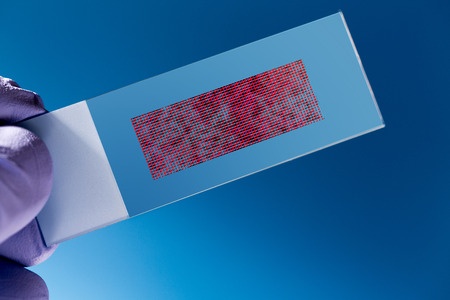Comparative Genomics Analysis (CGH)
The array-CGH analysis is a survey method based on comparative genomic hybridization (array-based comparative hybridization). This investigation has the purpose of identifying known DNA alterations as variations in the number of copies, which are not detectable with other conventional cytogenetic techniques. Variations in the number of copies may be deletions, loss of genome portions, or duplications/amplifications that consist of excess copies of DNA segments. These DNA abnormalities can be the cause of various constitutional illnesses, such as mental retardation syndromes, malformative syndromes, neurological disorders (eg autism and epilepsy) and various tumor pathologies.
Microgem Lab provides the “Comparative Genomics Analysis (CGH)” service by means of microarray to determine variations in the number of copies of DNA. Possibility to analyze DNA extracted from blood, cells and tissues of a wide variety of organisms and species.
Workflow of the “Comparative Genomic Analysis CGH” service.
- Consultancy – A free consultation will be provided for project optimization (number of samples to be analyzed, methodology, costs). During the consultation phase, advice will be provided on the extraction method to be taken. Alternatively, you can take advantage of our experience in DNA isolation.
- Sample Requirements –
- 2 ug of genomic DNA, from blood, cells, tissues ,of human, mouse, rat, for Direct Method
- 50-500 ng of genomic DNA for Amplification Method
- DNA samples, undergo to RNase treatment, are required to have an OD 260/280 ratio ≥8 and 260/230 ratio ≥ 1.9
Please supply a shot of agarose gel.
- Sample Quality Control (QC) - After receiving DNA samples, our researchers will evaluate the integrity and purity of each sample by MaestroNano microvolume reader and Bioanalyzer. Possible contamination for each sample will also be assessed. The results of this analysis will be sent before proceeding with the next steps of the service.
- Digestion of the Genomic DNA – The genomic DNA will be digested with Alu I and RSA I restriction enzymes. A digestion test will be performed by agarose gel analysis.
- Labeling, Hybridization and Reading of the Microarray – Experimental DNA sample and DNA reference will be labeled with Cyanine5-dUTP and Cyanine3-dUTP respectively, purified and co-hybridized on specific microarray. After washing, the microarray will be analyzed by scanner and the image analysis will be performed.
- Data Analysis – Analysis of Cyanine5/Cyanine3 ratios, normalization.
- Statistical Data Analysis – Identification and quantification of aberrant genomic regions by specific algorithms (Z-score, ADM-1 and ADM-2).
- Final Report – At the end of the project, a final report will be provided including the results of the various stages of project development. The results presented in the report can be discussed with the scientific team.
